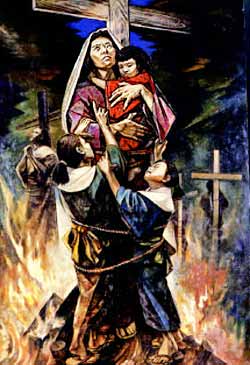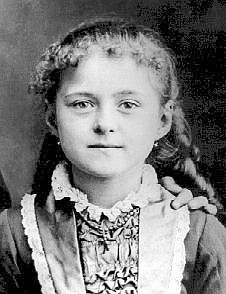The Kingship of Our Lord Jesus Christ
 The royalty of Christ rests upon a twofold basis. He is our King by right of birth and by right of conquest. The first refers us to the personality of the Son of God, whereby, in His divine nature as God and by virtue of the hypostatic union, He is the sovereign Lord and Master. The second places before us the God-Man coming down on earth to rescue fallen man from the slavery of Satan, and by the labors and sufferings of His life, and passion, and death, to win a glorious victory for us over sin and hell.
The royalty of Christ rests upon a twofold basis. He is our King by right of birth and by right of conquest. The first refers us to the personality of the Son of God, whereby, in His divine nature as God and by virtue of the hypostatic union, He is the sovereign Lord and Master. The second places before us the God-Man coming down on earth to rescue fallen man from the slavery of Satan, and by the labors and sufferings of His life, and passion, and death, to win a glorious victory for us over sin and hell.-As taken from the 1962 Roman Catholic Daily Missal-
Here's the link to what I wrote last year, on Christ the King :) And here's a link to a sermon by Archbishop Lefebvre on the 28th October, 1979 at Ecône, on the Feast of Christ the King.
And now for today, let me introduce to you, in my own little and insignificant way, my King, my Love and my All! :), my Jesus:


The above pictures give you the hymn for today's vespers, which describes very beautifully, Holy Mother Church's sentiments on this beautiful feast day.

From this post, Le Sacré-Coeur de Jésus,
Win souls for Me, many souls. Introduce Me into their homes. Bring Me near to hearts that suffer, near to the death bed of hardened sinners, and then you will see the glory and the wonders of My love.
Take and receive My divine Heart. I give It to you in the Holy Eucharist. It belongs to you. Let It be yours entirely. Love this divine Heart. O love It and permit It to reign by love."
My King gave me His Heart
Jesus gives Himself to me and also to you - entirely. He's whole self, He's whole body, He's whole soul, He's whole divinity, the fullness of Himself, His Most Precious Blood, shed for me and also for you. He's whole heart, He's whole being - All Divine! given to us, preciously in the Most Holy Eucharist. That one simple piece of bread, by Faith alone, is Jesus, Jesus's body and blood, soul and divinity, a supreme act of love, as St. Thomas Aquinas so beautifully describes, Amor amorum, the love of all loves.
Jesus stays in the tabernacle, so devoid of all majesty and earthly beauty, not because of anything, but because of only one thing - the great love He has, for you and for me. Nothing, stop short of His love, entices Him to stay there. Just for me, Just for you.
And from this post, after much reflection, thinking and meditation, after a struggle inside of me, after much "growing up" I must admit, after not being able to attend daily mass as often as I want too, after an absence , after so many things, Deo volente, that I realised how true this cliched phrase is, Absence does make the Heart grow fonder.
Jesus didn't want to be absent from us. He's 33 years on earth was not enough, not sufficient to quench His thirst, His love for souls. He had to be with us, as He said in the Gospels, till the very end, till the last hour, the last minute, the last second, till the end of time. Thus, as Saint Pio beautifully describes, "It is easier for the earth to exist without the sun than without the holy Sacrifice of the Mass.”
And that's the beauty of the Most Holy Eucharist, the beauty of the Mass, and the beauty of His Passion and also the beauty of the Compassion of it All. His Heart, burning with the fire of divine love, His Mother, dearest Mother Mary, full of Sorrow, yet so Immaculate and so Compassionate.
What must Jesus have felt, from the depths of His dearest, most amiable, most beautiful wounded heart, not withstanding all the sorrow He had to go through His passion etc., when He went through the Passion, the Crucifixion and all that He went through throughout His entire life? The love that must have been burning in His Heart for souls, so pure, so chaste, so beautiful, must be the driving force for every single action, every single thought, every single word of our dearest Jesus, our Redeemer, for though it was through one man, Adam that caused the downfall of men, it was through this new Adam, my Jesus :) and your Jesus too :), that the Redemption of mankind was secured. 
My King gave me His Life
I write here something, read from a most beautiful book, The Passion and Death of Jesus Christ by St. Alphonsus Ligouri, no one has done so beautifully for his/her loved one. Amor meus crucifixus est. My Love is crucified, my love is crucified. Yes, my dearest Jesus is crucified. He was crucified some 2007 years ago, 33 A.D. And His Passion, His Crucifixion, is repeated daily, yes daily, at the august Sacrifice of the Most Holy Mass. 
The beautiful Mass, so sublime, so subtle! Every action, every rubric, every turn, every step, every bell, every word, every part of the Mass - all washed with the blood of the Lamb. Most priceless. Most beautiful. Saint Pio, dear Padre, whose picture you now see, the berühmt (famous) stigmatist of our times lived the Mass, for almost 50 years of his life.
Every part of the rite of the Tridentine Mass, beautifully stitched together, every time you open the Missal, every time a Mass is said, it is the Passion and Crucifixion of my Jesus. And as you flip through a Missal, as you read and as you say the prayers of the Mass, as you follow the Mass with your heart and your mind, you see a book, covered with blood, a book covered with the sweat, the blood, the tears, the labour of all the Saints, all the Martyrs, you see the sorrow, the Passion, the Compassion, you might feel, in your very dear heart, that supreme love, that supreme act of justice, that your redeemer went through for you. For it is there, at Mass, that the priest takes the place of Jesus and offers up the victim (who is none other than Jesus Himself) for us, for souls, for all the intentions.
And when it comes to the consecration, we see Jesus arriving at Calvary, after His long patience with all the scourgings, the crowing with thorns, the carrying of the cross, ready and about to be sacrificed. The priest says the Hanc igitur softly, spreading his hands over the oblation, the offering of the Victim, and gives the Victim to God.
My Jesus, pardon and mercy, by the merits of Thy Holy Wounds!
Then the priest says the words of the Consecration and the Elevation takes place. The 12th station of the cross: the Cross is raised.
"Father, forgive them!", "Behold thy Mother!", "I thirst!" ...
The Most beautiful words, uttered in a silent whisper, again, only by the priest, over the hosts that are to be consecrated, Hoc est enim Corpus Meum. The Bread becomes the Body and Blood of Jesus. Boom! The "magic", the love, the faith of it all. Jesus is really present in the Most Holy Sacrament of the Altar!
The priest genuflects, this represents the nailing of His most precious hands to the ignominous wood of the Cross.
The 2nd consecration, the cross is raised (as in the chalice is raised). And the Blood flows. Jesus is on the Cross for 3 hours and He utters 7 words. 7 most precious words. The priest again says the words of the consecration. For this is the Chalice of My Blood, of the new and eternal testament. The mystery of faith: which shall be shed for you and for many unto the remission of sins.
Be mindful O Lord, of thy creature whom Thou hast redeemed by Thy most Precious Blood,
O Blood of Jesus, Most Precious Blood shed for me, Thou art all my hope! In Thee I seek refuge.
The Body and the Blood of Jesus. All there, All for me, All for you, each time we kneel at the communion rail, after the striking of our breasts, saying or remembering the words of the centurion of Capharnum (with profound humility and unshaken confidence), Domine, non sum dignus, ut intres sub tectum meum, sed tantum dic verbo, et sanabitur anima mea. Lord, I am not worthy that Thou shouldst enter under my roof, but only say the word, and my soul shall be healed.
Jesus appears to His Mother on Easter morning.
O dearest Mother, when He lifts His Face, to thy sweet embrace, O speak to Him, O Mother of me. Tell Him how much I want to love Him, teach me dearest Mother, how much I should treasure Him, teach me mother, how I should carry Him, so tenderly, in my heart. Teach me Mother, Help me, dearest Mother. 
We kneel down at the communion rail, the moment arrives, My Jesus gives Himself entirely to me, I give myself entirely to Him.
And He is all Mine. My King is all Mine, yes, my dearest King is all Mine, and I am all His.
And that is the beauty of the Mass and the Holy Eucharist, that is the beauty of my King, Our Lord, Jesus Christ. :)
My Jesus, help me only to do Thy Most Holy Will.

Cor Jesu sacratissimum, Miserere nobis. (ter)
Jesus, Mary, I love Thee; Save Souls!
Jesu mitis et humilis corde, Fac cor nostrum secundum Cor tuum. (ter)
Christ Conquers! Christ Reigns! Christ Commands!
Labels: Alone with God by Fr J Heyrman S.J., Feast of Christ the King, Le Sacré-Coeur de Jésus
















































